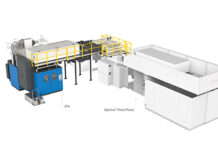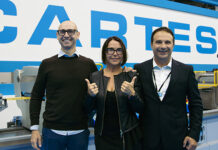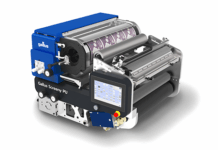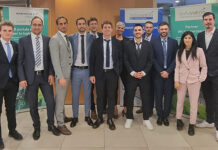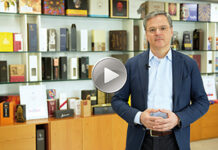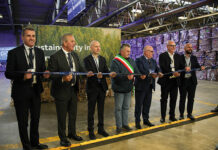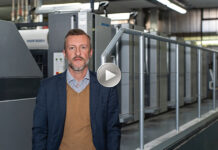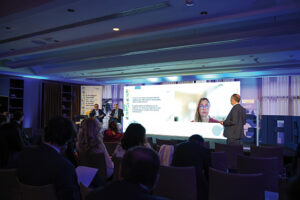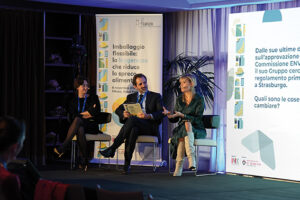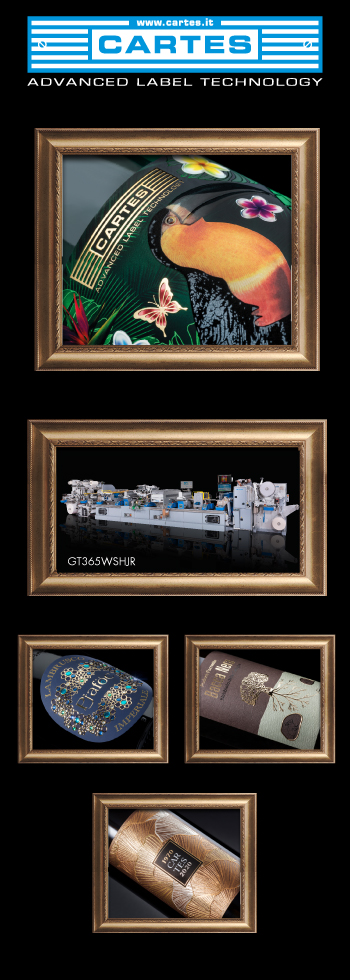The autumn event of Giflex, the Italian Flexible Packaging Producers Group sponsored by INX Srl and Ipack-Ima, which was held in Milan on 6 November brought together over 200 participants for the conference “Flexible packaging: lightness that reduces waste food”. At the center of the debate economy and re-globalization, climate change, food waste and PPWR
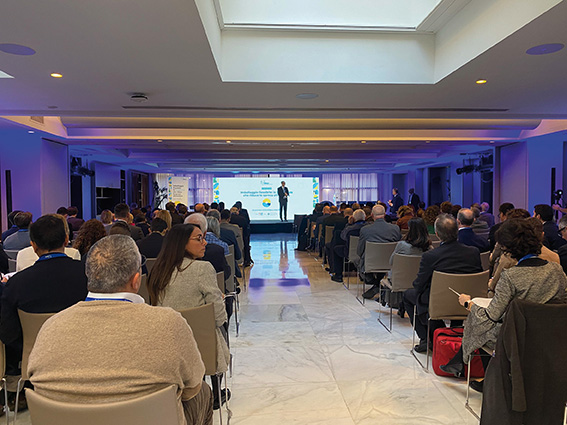
The flexible packaging sector, with over 4 billion euros in turnover and an employment level that has reached over 10,500 units in Italy, confirms itself as a resilient industry capable of proactively adapting to changing market needs. After all, the Covid period has demonstrated this, and the plastic packaging sector, which has always been under the eye of critics, has been widely re-evaluated. Now that that period is fortunately behind us, the sector is once again called upon to make its voice heard also in view of the next measures at European level which will concern the world of packaging, and on which our country is at the forefront with lobbying actions both at a national level, with the fruits of an activity begun a few years ago, thanks to which the Italian political world has begun to address these issues with a certain knowledge of the facts, trying to leave ideological positions behind. This same type of work is also underway in the European Community, and we will see next year if and what results will be achieved.
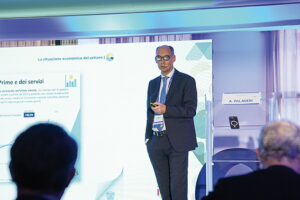 “The economic results of 2022 are positive for our sector, the turnover has grown exceeding 4 billion euros, the employment force has increased but it should be underlined that the costs of raw materials and energy are growing more. Despite this, the majority of associated companies have improved their financial sustainability”, says Alberto Palaveri at the opening of the meeting, “we are still a healthy sector and despite a compression of margins, over 90% of companies records profits. However, it is interesting to note how the return on investments is decreasing. The Covid period had given rise to hopes for more work for everyone, and the incentives of 4.0 pushed companies to invest, but without generating the necessary profitability and returning on investments. These data must open up serious reflection for companies on how to best optimize their investments for the years to come”.
“The economic results of 2022 are positive for our sector, the turnover has grown exceeding 4 billion euros, the employment force has increased but it should be underlined that the costs of raw materials and energy are growing more. Despite this, the majority of associated companies have improved their financial sustainability”, says Alberto Palaveri at the opening of the meeting, “we are still a healthy sector and despite a compression of margins, over 90% of companies records profits. However, it is interesting to note how the return on investments is decreasing. The Covid period had given rise to hopes for more work for everyone, and the incentives of 4.0 pushed companies to invest, but without generating the necessary profitability and returning on investments. These data must open up serious reflection for companies on how to best optimize their investments for the years to come”.
Consumption trends for flexible packaging are growing compared to other types of packaging
In 2022, over 4 trillion packaged products were consumed throughout the world, an impressive number if we consider a world population of around 8 billion people, and the flexible packaging sector, which is worth 32% of the total in pieces, will grow by 3.1% in the two-year period 2023-2025. “In the food sector, one package out of two is made of flexible material and 52% of the packaging in a supermarket is created with only 15% of the raw material used. This is on the one hand an advantage, but on the other it penalizes us in terms of the weight of the packaging, an aspect that leads us to be little considered by those who manage the end of life of the packaging. If we talk about perceived value at consumer level, we must underline how flexible packaging accompanies the life of each of us in a stronger way than other types of packaging that weigh more. We do our job well with lightweight solutions and I believe we should be held in greater consideration”, says Palaveri, providing data on the growth of packaging technologies in the world, whose presence is well distributed with countries with a long tradition such as United States and Europe which will continue to have a primary role in the growth and development of packaging.
Packaging: son of our times
To respond to the positions of the European Community which claims that there is no evidence that packaging extends the life of products, Palaveri then wanted to present some data taken from the survey carried out by Nomisma on the occasion of the fourth Consumer Packaging Observatory on consumers’ perception of packaging. For 66% of those interviewed, packaging is considered a tool capable of extending the shelf-life of products, ahead of the ability to protect their organoleptic properties in 60% of the responses and contributes to define the sustainability of a product for 47% of the respondents. Given the objective of reducing waste generated by packaging, consumers do not like overpackaging (58%) while 56% of those interviewed declare that they appreciate the total recyclability of the packaging and in general reduced quantities of plastic are appreciated.
And on the basis of these sure data, it will be necessary to continue the activity at institutional level, especially at European level, to make understand those who will have to make important decisions the need to delve deeper into the issues, especially when measures capable of influencing the economic life of a sector are approved. And it is always important to remember that this sector, in addition to offer a vitally important service, is also a source of work for thousands of families. Then, before launching alarmisms against plastic in this case, but it is an approach that applies in general, it should be done with full knowledge of the facts.
Packaging is therefore able to guide consumers’ choices, so much so that 92% of interviewed people responded that they take it into consideration when purchasing or not purchasing a product.
“By commenting on these data, I would like to further underline the importance of the work of Giflex technical committees, which with their studies and analyzes support the activity of the association in moments of discussion with the institutions then called to legislate on the matter”, concludes Alberto Palaveri.
Re-globalisation, climate change, fight against food waste, packaging waste regulation: the situation
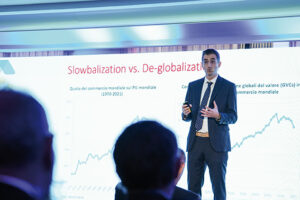 Following the speech by Fadi Hassan, Research Associate at the Center for Economics Performance, The London School of Economics and Political Science (LSE) with a speech entitled “Italian companies in the new phase of re-globalisation”. The presentation analyzed the trends of the new phase of globalization, the so-called “slowbalization”, its causes and implications for Italian companies. The speaker also focused on the internationalization strategies of Italian companies given the recent bottlenecks in global value chains and the ongoing geopolitical tensions.
Following the speech by Fadi Hassan, Research Associate at the Center for Economics Performance, The London School of Economics and Political Science (LSE) with a speech entitled “Italian companies in the new phase of re-globalisation”. The presentation analyzed the trends of the new phase of globalization, the so-called “slowbalization”, its causes and implications for Italian companies. The speaker also focused on the internationalization strategies of Italian companies given the recent bottlenecks in global value chains and the ongoing geopolitical tensions.
Among the pressing current issues, the focus on climate and environment could not be missing. On stage Matteo Reale, Environmental Communication Expert, interviewed Serena Giacomin, President of the Italian Climate Network, meteorologist, climatologist, winner of the 2021 DonnAmbiente Award and television presenter of weather and environmental analysis programs.
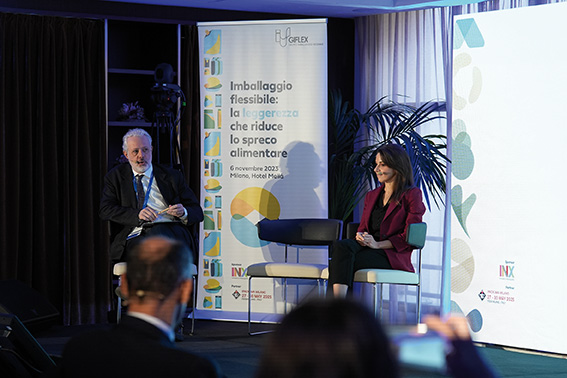
Starting from the story that “not everything you hear about the climate is true”, Serena Giacomin highlighted how “the right transition focuses on the creation of new employment opportunities, on training workers for new skills and on building a sustainable future that takes into account social and economic concerns. All this appears far from trivial, but not impossible, thanks to science, synergistic knowledge and fast-moving technology, without forgetting to put always people at the center.”
With the keynote speech by Rosa S. Rolle, Senior Enterprise Development Officer, Food and Agriculture Organization of the United Nations, we entered the heart of the debate on the strategic role of packaging against food waste.
“Globally, an estimated 13% of the world’s food is lost in the supply chain after harvest and before retail. A further 17% of food is wasted in households, food services and retail. Food losses and waste represent a waste of resources – land, labour, energy and water – used in food production and represent 8-10% of global greenhouse gas emissions”. commented FAO spokeswoman.
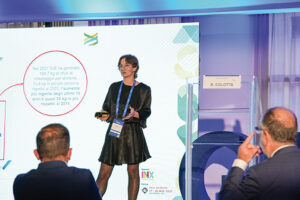 At Conference, directly from Brussels, Roberta Colotta, Head of Public Affairs FPE, explained where we are at and what the next steps will be for the approval of the European Packaging and Packaging Waste Regulation. “We are less than a month away from the vote on PPWR in plenary of the European Parliament. This new regulation represents challenges and opportunities for the world of flexible packaging. Many parts have improved compared to the Commission’s text but others still remain to be refined, such as the safety nets for minimum recycled content. The flexible industry aims to be the point of reference to guide the legislator towards a text that has as its objective the reduction of resources used in the production of packaging and more recycling. We hope that Europe listens to us!”
At Conference, directly from Brussels, Roberta Colotta, Head of Public Affairs FPE, explained where we are at and what the next steps will be for the approval of the European Packaging and Packaging Waste Regulation. “We are less than a month away from the vote on PPWR in plenary of the European Parliament. This new regulation represents challenges and opportunities for the world of flexible packaging. Many parts have improved compared to the Commission’s text but others still remain to be refined, such as the safety nets for minimum recycled content. The flexible industry aims to be the point of reference to guide the legislator towards a text that has as its objective the reduction of resources used in the production of packaging and more recycling. We hope that Europe listens to us!”
Prestigiose le presenze istituzionali, a conferma del costante dialogo di Giflex con la politica. Sui temi più caldi della giornata sono intervenuti: Maria Chiara Gadda, Vice Presidente Commissione Agricoltura della Camera dei Deputati, autrice Legge 166 sugli sprechi alimentari; Diego Invernici, Consigliere regionale e componente della Commissione Attività produttive, istruzione, formazione e occupazione della Regione Lombardia; Francesca Siciliano Stevens, Managing Director EUROPEN; Silvia Sardone, Eurodeputata e componente della Commissione Ambiente (ENVI) del Parlamento europeo.
Prestigious institutional presences confirmed Giflex’s constant dialogue with politics. On the hottest topics of the day spoke: Maria Chiara Gadda, Vice President of the Agriculture Commission of the Chamber of Deputies, author of Law 166 on food waste; Diego Invernici, Regional Councilor and member of the Productive Activities, Education, Training and Employment Commission of Lombardy Region; Francesca Siciliano Stevens, Managing Director EUROPEN; Silvia Sardone, MEP and member of the Environment Commission (ENVI) of the European Parliament.





